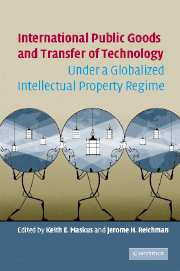Book contents
- Frontmatter
- Contents
- List of contributors
- Preface
- PART I International Provision of Public Goods under a Globalized Intellectual Property Regime
- PART II Innovation and Technology Transfer in a Protectionist Environment
- PART III Sectoral Issues: Essential Medicines and Traditional Knowledge
- PART IV Reform and Regulation Issues
- 22 Issues Posed by a World Patent System
- 23 Intellectual Property Arbitrage: How Foreign Rules Can Affect Domestic Protections
- 24 An Agenda for Radical Intellectual Property Reform
- Comment: Whose Rules, Whose Needs? Balancing Public and Private Interests
- 25 Diffusion and Distribution: The Impacts on Poor Countries of Technological Enforcement within the Biotechnology Sector
- 26 Equitable Sharing of Benefits from Biodiversity-Based Innovation: Some Reflections under the Shadow of a Neem Tree
- 27 The Critical Role of Competition Law in Preserving Public Goods in Conflict with Intellectual Property Rights
- 28 Expansionist Intellectual Property Protection and Reductionist Competition Rules: A TRIPS Perspective
- 29 Can Antitrust Policy Protect the Global Commons from the Excesses of IPRs?
- Comment I: Competition Law as a Means of Containing Intellectual Property Rights
- 30 “Minimal” Standards for Patent-Related Antitrust Law under TRIPS
- Comment II: Competitive Baselines for Intellectual Property Systems
- 31 WTO Dispute Settlement: Of Sovereign Interests, Private Rights, and Public Goods
- 32 The Economics of International Trade Agreements and Dispute Settlement with Intellectual Property Rights
- 33 Intellectual Property Rights and Dispute Settlement in the World Trade Organization
- 34 WTO Dispute Resolution and the Preservation of the Public Domain of Science under International Law
- 35 Recognizing Public Goods in WTO Dispute Settlement: Who Participates? Who Decides? The Case of TRIPS and Pharmaceutical Patents Protection
- Index
31 - WTO Dispute Settlement: Of Sovereign Interests, Private Rights, and Public Goods
Of sovereign interests, private rights and public goods
Published online by Cambridge University Press: 05 May 2010
- Frontmatter
- Contents
- List of contributors
- Preface
- PART I International Provision of Public Goods under a Globalized Intellectual Property Regime
- PART II Innovation and Technology Transfer in a Protectionist Environment
- PART III Sectoral Issues: Essential Medicines and Traditional Knowledge
- PART IV Reform and Regulation Issues
- 22 Issues Posed by a World Patent System
- 23 Intellectual Property Arbitrage: How Foreign Rules Can Affect Domestic Protections
- 24 An Agenda for Radical Intellectual Property Reform
- Comment: Whose Rules, Whose Needs? Balancing Public and Private Interests
- 25 Diffusion and Distribution: The Impacts on Poor Countries of Technological Enforcement within the Biotechnology Sector
- 26 Equitable Sharing of Benefits from Biodiversity-Based Innovation: Some Reflections under the Shadow of a Neem Tree
- 27 The Critical Role of Competition Law in Preserving Public Goods in Conflict with Intellectual Property Rights
- 28 Expansionist Intellectual Property Protection and Reductionist Competition Rules: A TRIPS Perspective
- 29 Can Antitrust Policy Protect the Global Commons from the Excesses of IPRs?
- Comment I: Competition Law as a Means of Containing Intellectual Property Rights
- 30 “Minimal” Standards for Patent-Related Antitrust Law under TRIPS
- Comment II: Competitive Baselines for Intellectual Property Systems
- 31 WTO Dispute Settlement: Of Sovereign Interests, Private Rights, and Public Goods
- 32 The Economics of International Trade Agreements and Dispute Settlement with Intellectual Property Rights
- 33 Intellectual Property Rights and Dispute Settlement in the World Trade Organization
- 34 WTO Dispute Resolution and the Preservation of the Public Domain of Science under International Law
- 35 Recognizing Public Goods in WTO Dispute Settlement: Who Participates? Who Decides? The Case of TRIPS and Pharmaceutical Patents Protection
- Index
Summary
The problem spelled out
The focus of this section on intellectual property rights begs the larger question of whether the WTO mechanism to settle trade disputes between states takes sufficient account of so-called “public goods” in general. It obliges us immediately to ask what public goods could be relevant in WTO disputes as a whole.
The very objective of trade liberalization, the leitmotif of the WTO, as well as its ancillary aim of protecting intellectual property (IP), as enshrined in the TRIPS Agreement, could in their own right be seen as public goods. Their achievement is said to make everyone better off. Fewer trade restrictions result in a more efficient allocation of world resources and more IP protection spurs innovation and economic growth. Market forces – when it comes to freer trade, in particular domestic political markets – do not sufficiently provide these goods, hence the need for regulatory intervention (in the field of trade, intervention of a negative nature, prohibiting restrictions; in the IP field, intervention of a positive nature, prescribing minimum levels of protection) and the public nature of these goods.
WTO disputes may also touch upon other public goods, often portrayed as goods or objectives that clash with the primary WTO aims of trade liberalization and IP protection. Examples of such public goods are the protection of the environment, respect for human rights, sustainable development, and the transfer of technology and resources from developed to developing countries.
- Type
- Chapter
- Information
- International Public Goods and Transfer of Technology Under a Globalized Intellectual Property Regime , pp. 815 - 830Publisher: Cambridge University PressPrint publication year: 2005
- 1
- Cited by



